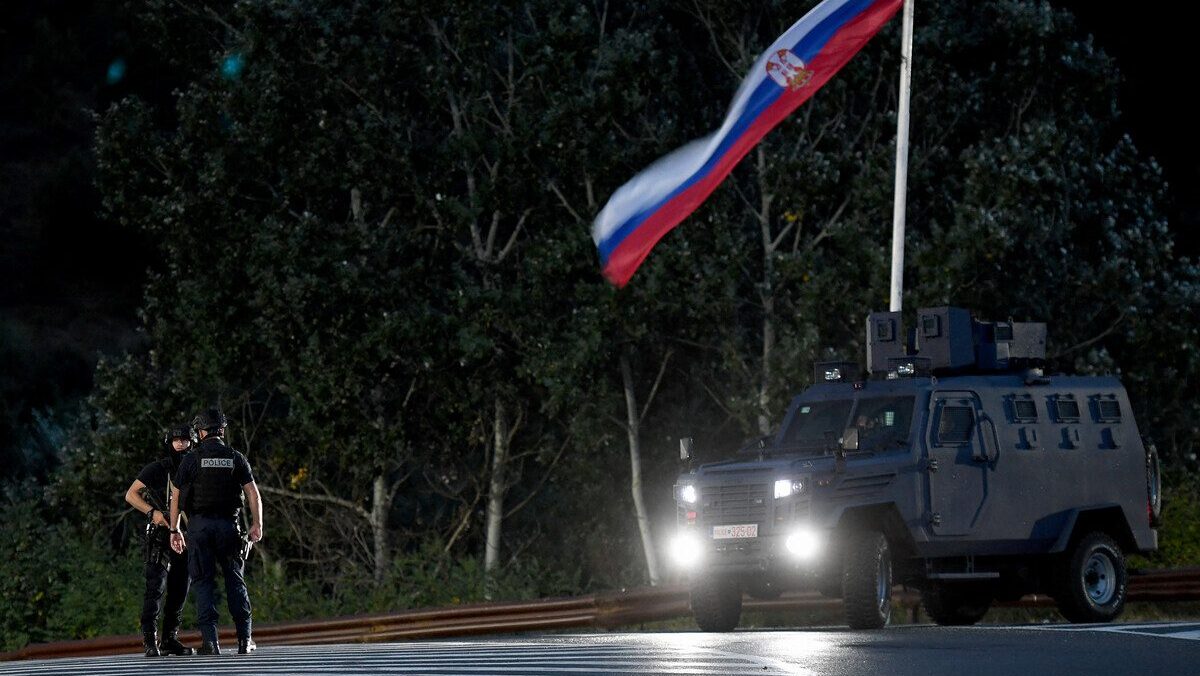
Kosovo police officers stand guard at the entrance of the village of Banjska, northern Kosovo on September 24, 2023.
Photo: STRINGER / AFP
NATO forces are preparing for a potential rapid deployment in the Balkans this week after clashes between Kosovar police and what appears to be an armed contingent of Serbian nationalists resulted in the deaths of one police officer and three Serb militants in the northern Kosovar village of Banjska on Sunday, September 23rd.
Violence erupted Sunday morning at approximately 3 a.m. local time when Kosovar forces arrived to remove barricades erected by Serbian nationalists. An ensuing firefight resulted in the death of one Kosovar police officer.
Монастырь Баньска и всё село на севере Косова и Метохии сейчас в блокаде. Никому не дают ни зайти, ни выйти, передаёт источник RT с места:
— Olesya 🇷🇺🇧🇾🇷🇸 (@olesya___2701) September 24, 2023
«Тут как раз серб один пытался детей у бабушки забрать и домой отвезти — не дают». pic.twitter.com/hJ98CB7wdj
The fighting culminated in a day-long siege at a nearby Orthodox monastery, resulting in the death of three Serbs and authorities reporting the arrest of 30 Serbians. Kosovo’s PM Albin Kurti has already pointed the finger at Belgrade for being behind what he called a criminal plot.
Still bearing the political scars of the break-up of Yugoslavia in the 1990s, Serbia maintains an ironclad irredentist claim on Kosovo despite its ongoing attempts to join the EU and geopolitical fence sitting regarding the war in Ukraine.
Northern Kosovo has been mired in communal violence in recent months as local Serbs protest against the imposition of ethnic Albanian mayors. Both the United States and the EU have traditionally been strong proponents of the Kosovar cause, much to the umbrage of Serbian nationalists who regard Kosovo as little more than a NATO puppet state.
In a national address following the day’s bloodshed, Serbian President Aleksandar Vučić put the blame on Kosovar authorities for provoking the situation and forcing local Serbs to erect barricades, stating that his government had recordings of police laughing as they fired on the besieged Serbs.
“Albin Kurti is the only culprit. He wants to drag us into a war with NATO and he has no other desire. It’s the only thing that works all the time” the Serbian leader declared as he compared the weekend of violence to one of the worst political nadirs in his country’s recent history.
🇷🇸 Serbian President rules out the possibility of recognizing Kosovo's independence
— Zlatti71 (@djuric_zlatko) September 24, 2023
📝 “Serbia will never recognize the monstrous creation that you created through the bombing of Serbia and lies,” said the head of state.
The President addresses the nation. Let us wish Serbia… pic.twitter.com/LiqEYfSvJz
In line with supporting Pristina, Brussels’s top diplomat Josep Borell likened the actions of the Serbian nationalists to that of an “armed gang” as he called on violence against Kosovar authorities to cease.
As a legacy of the Yugoslavian wars, Kosovo has a contingent of 4,500 NATO forces on the ground who have rowed strongly behind the Kosovar government as they announced their willingness to intervene should the violence escalate.
Considering Serbia’s historic links with Russia there have been fears in the West that the region could emerge as a new conflict hot spot in light of the war in Ukraine. The Kosovar government has alleged that both Moscow and Beijing sought to use Serbia as a soft underbelly to destabilise Europe.
The deaths over the weekend are likely to complicate attempts to get both Serbia and Kosovo into the EU by 2030, as Brussels has made the normalisation of relations between the two foes mandatory for admission into the bloc.
🚨 Un policier #Kosovo a été tué et un autre blessé lors d'une attaque près de la ville du nord de #Leposavic aujourd'hui vers 03h00 du matin, a confirmé le Premier ministre Albin Kurti.
— Actu Kosovo 🇽🇰 (@ActuKosovo) September 24, 2023
"Les attaquants sont des professionnels lourdement armés et masqués", a déclaré Kurti. pic.twitter.com/h0obYuokIF
